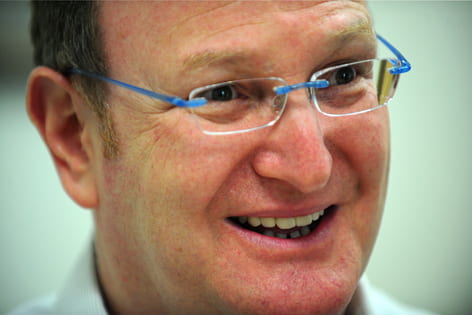Fighting for their lives
Dr. Leonard Sender is a leading advocate for a neglected demographic: young adults with cancer.

Dr. Leonard Sender asks his young adult cancer patients questions they don’t usually hear from an oncologist: “Who are you? What do you want to do with your life? What are your dreams?”
“I call it meaningful survival,” Sender says. “I want these young adults to go on and do things like extreme sports or art or photography or whatever happens to be their passion. Cancer is a wake-up call to live your life.”
Sender directs the Young Adult Cancer Program at UC Irvine Medical Center, which he established five years ago for patients ages 18-39. Located at the Chao Family Comprehensive Cancer Center, it’s one of the few programs nationwide exclusively for young adults. (UCI sorority and fraternity members designated the program as the beneficiary of their Greek Songfest fundraiser April 24. See related story and video.)
“This age group has been neglected. There haven’t been advances in their survival rate in more than 20 years. They’ve hit a plateau,” Sender says.
The medical profession tends to divide cancer patients into two groups: children and older adults — those over 50 who face colon, prostate, breast, lung and other common cancers. Because oncology offices see few adolescents and young adults, most put them in one group or the other, Sender says.
The consequences can be deadly.
Studies have shown that this age group would have a 30 percent higher survival rate if treated with the same aggressive chemotherapy as pediatric patients, Sender says. Yet many oncologists treat them as they would older adults, who can’t tolerate the higher, more frequent doses of chemotherapy.
“They don’t understand this unique group of patients,” Sender says. “Their treatment is dumbed down. If we could raise that awareness, many of these patients could be cured.”
Sender wants to see more research devoted to the types of cancer that usually afflict young adults, such as leukemia and thyroid, testicular and ovarian cancer.
“There’s nothing worse than holding the hand of a young adult who’s dying of cancer when you know so little research is being done,” he says.
Young adults also have different emotional and social needs than children and older adults.
“This is the most exciting time in a person’s life, when they’re learning to be independent, and suddenly it’s interrupted with a cancer diagnosis,” Sender says. “For them, it can easily mean the end of a relationship. They often have to put college on hold, lose their jobs and can’t get insurance.
“But they have a great, hopeful attitude. It’s not: ‘Oh, pity me.’ It’s: ‘Just tell me what I need to do to get better, to get on with my life.’ When you see their no-nonsense approach to cancer, it’s refreshing.”
Sender, who also serves as medical director of the Cancer Institute at CHOC, has launched grassroots efforts to address the needs of this overlooked patient population. He’s sponsoring the SeventyK patient bill of rights, which aims to improve care for the 70,000 adolescents and young adults diagnosed with cancer in the U.S. each year. He hopes to collect 70,000 signatures, then present the petition to state, national and world leaders.
In addition, he chairs the I’m Too Young for This! Cancer Foundation, which provides advocacy and support for young adult cancer patients.
“We want to inspire doctors to think of young adults in their practice,” Sender says. “These patients may live another 50 years. We need to consider the consequences — like infertility — when deciding upon a course of treatment.”
He keeps tabs on his patients’ progress long after their cancers go into remission. On his computer, he shows visitors edgy images of women photographed by former patient Margo Moritz. She’s a survivor of Burkitt’s lymphoma, a fast-growing cancer that usually strikes children.
“Cancer made me realize life is too good to waste on things you’re not passionate about,” Moritz says. “Once I got healthy enough, I moved to San Francisco and enrolled in a master’s photography program at the Academy of Art University. Dr. Sender encourages the idea that cancer doesn’t stop you from living; it makes you live a fuller life.”
For Sender, such stories are the best part of practicing medicine.
“The reward is seeing a young adult who may have died go on to become this whole person,” he says. “It’s amazing to see them fulfill their dreams.”
Originally published in Vol. 1, Iss. 5 ZotZine